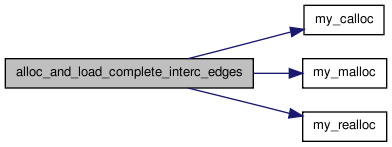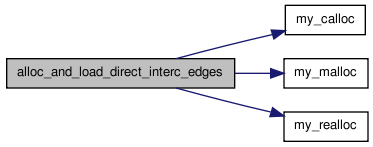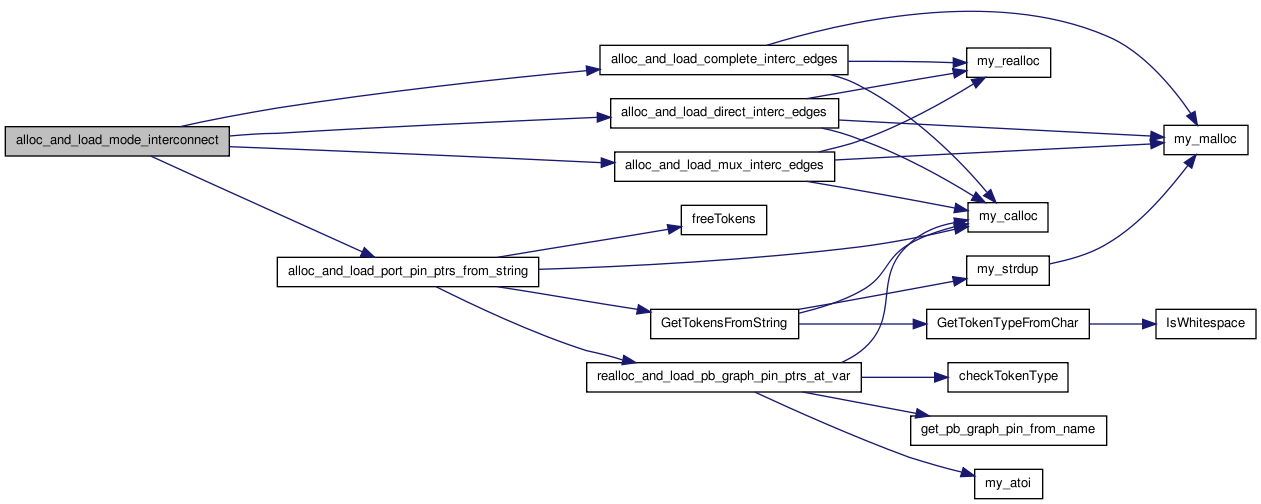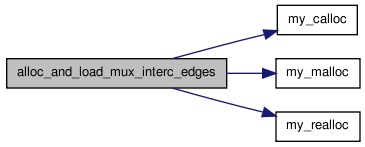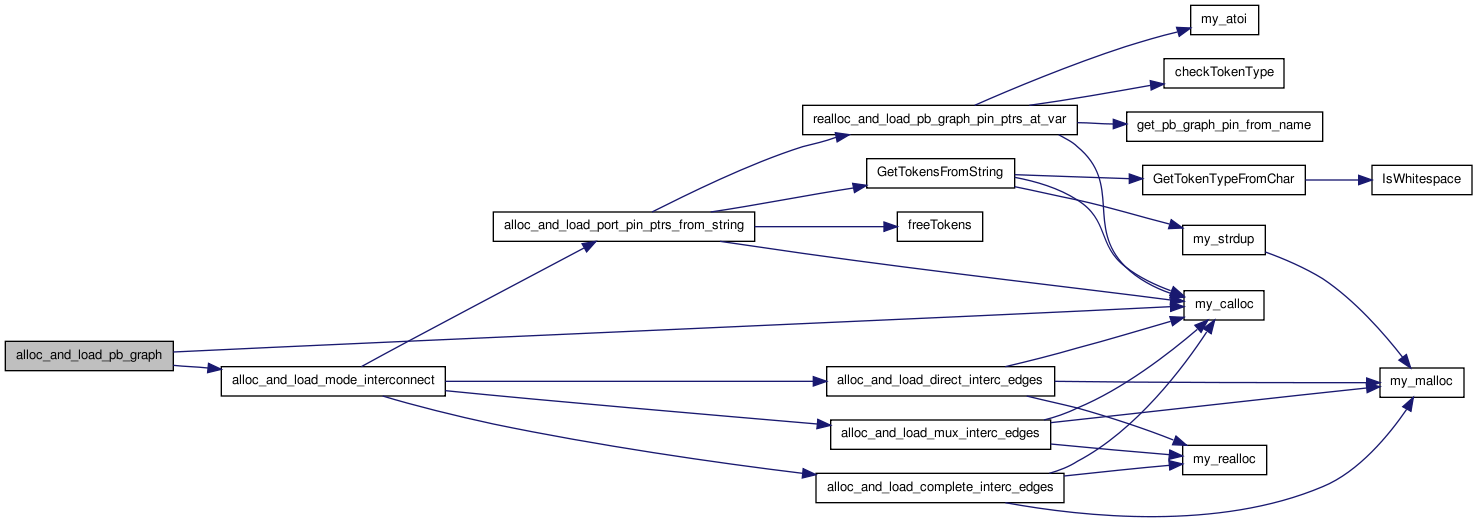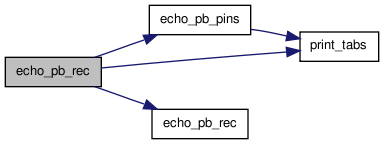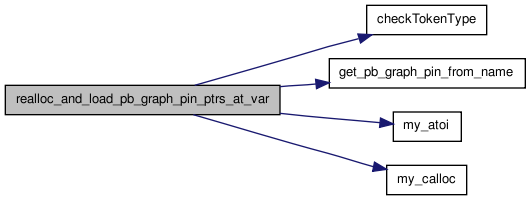#include <stdio.h>#include <assert.h>#include <string.h>#include "util.h"#include "token.h"#include "arch_types.h"#include "vpr_types.h"#include "globals.h"#include "vpr_utils.h"#include "pb_type_graph.h"#include "pb_type_graph_annotations.h" Include dependency graph for pb_type_graph.c:
Include dependency graph for pb_type_graph.c:Go to the source code of this file.
Functions | |
| static int | check_pb_graph () |
| static void | alloc_and_load_pb_graph (INOUTP t_pb_graph_node *pb_graph_node, INP t_pb_graph_node *parent_pb_graph_node, INP const t_pb_type *pb_type, INP int index) |
| static void | alloc_and_load_mode_interconnect (INOUTP t_pb_graph_node *pb_graph_parent_node, INOUTP t_pb_graph_node **pb_graph_children_nodes, INP const t_mode *mode) |
| static boolean | realloc_and_load_pb_graph_pin_ptrs_at_var (INP const t_pb_graph_node *pb_graph_parent_node, INP t_pb_graph_node **pb_graph_children_nodes, INP boolean interconnect_error_check, INP boolean is_input_to_interc, INP const t_token *tokens, INOUTP int *token_index, INOUTP int *num_pins, OUTP t_pb_graph_pin ***pb_graph_pins) |
| static t_pb_graph_pin * | get_pb_graph_pin_from_name (INP const char *port_name, INP const t_pb_graph_node *pb, INP int pin) |
| static void | alloc_and_load_complete_interc_edges (INP t_interconnect *interconnect, INOUTP t_pb_graph_pin ***input_pb_graph_node_pin_ptrs, INP int num_input_sets, INP int *num_input_ptrs, INOUTP t_pb_graph_pin ***output_pb_graph_node_pin_ptrs, INP int num_output_sets, INP int *num_output_ptrs) |
| static void | alloc_and_load_direct_interc_edges (INP t_interconnect *interconnect, INOUTP t_pb_graph_pin ***input_pb_graph_node_pin_ptrs, INP int num_input_sets, INP int *num_input_ptrs, INOUTP t_pb_graph_pin ***output_pb_graph_node_pin_ptrs, INP int num_output_sets, INP int *num_output_ptrs) |
| static void | alloc_and_load_mux_interc_edges (INP t_interconnect *interconnect, INOUTP t_pb_graph_pin ***input_pb_graph_node_pin_ptrs, INP int num_input_sets, INP int *num_input_ptrs, INOUTP t_pb_graph_pin ***output_pb_graph_node_pin_ptrs, INP int num_output_sets, INP int *num_output_ptrs) |
| static void | alloc_and_load_pin_locations_from_pb_graph (t_type_descriptor *type) |
| static void | echo_pb_rec (INP const t_pb_graph_node *pb, INP int level, INP FILE *fp) |
| static void | echo_pb_pins (INP t_pb_graph_pin **pb_graph_pins, INP int num_ports, INP int level, INP FILE *fp) |
| static void | free_pb_graph (INOUTP t_pb_graph_node *pb_graph_node) |
| void | alloc_and_load_all_pb_graphs () |
| void | free_all_pb_graph_nodes () |
| void | echo_pb_graph (char *filename) |
| t_pb_graph_pin *** | alloc_and_load_port_pin_ptrs_from_string (INP const t_pb_graph_node *pb_graph_parent_node, INP t_pb_graph_node **pb_graph_children_nodes, INP const char *port_string, OUTP int **num_ptrs, OUTP int *num_sets, INP boolean is_input_to_interc, INP boolean interconnect_error_check) |
| static void | echo_pb_rec (const INP t_pb_graph_node *pb_graph_node, INP int level, INP FILE *fp) |
Variables | |
| static int | pin_count_in_cluster |
| static struct s_linked_vptr * | edges_head |
| static struct s_linked_vptr * | num_edges_head |
Detailed Description
Jason Luu July 17, 2009 pb_graph creates the internal routing edges that join together the different pb_types modes within a pb_type
Definition in file pb_type_graph.c.
Function Documentation
| void alloc_and_load_all_pb_graphs | ( | ) |
Allocate memory into types and load the pb graph with interconnect edges
Definition at line 85 of file pb_type_graph.c.
{
int i, errors;
edges_head = NULL;
num_edges_head = NULL;
for(i = 0; i < num_types; i++) {
if(type_descriptors[i].pb_type) {
pin_count_in_cluster = 0;
type_descriptors[i].pb_graph_head = my_calloc(1, sizeof(t_pb_graph_node));
alloc_and_load_pb_graph(type_descriptors[i].pb_graph_head, NULL, type_descriptors[i].pb_type, 0);
type_descriptors[i].pb_graph_head->total_pb_pins = pin_count_in_cluster;
alloc_and_load_pin_locations_from_pb_graph(&type_descriptors[i]);
} else {
type_descriptors[i].pb_graph_head = NULL;
assert(&type_descriptors[i] == EMPTY_TYPE);
}
}
errors = check_pb_graph ();
if(errors > 0) {
printf("Errors in pb graph");
exit(1);
}
for(i = 0; i < num_types; i++) {
if(type_descriptors[i].pb_type) {
load_pb_graph_pin_to_pin_annotations(type_descriptors[i].pb_graph_head);
}
}
}
 Here is the call graph for this function:
Here is the call graph for this function: Here is the caller graph for this function:
Here is the caller graph for this function:| static void alloc_and_load_complete_interc_edges | ( | INP t_interconnect * | interconnect, |
| INOUTP t_pb_graph_pin *** | input_pb_graph_node_pin_ptrs, | ||
| INP int | num_input_sets, | ||
| INP int * | num_input_ptrs, | ||
| INOUTP t_pb_graph_pin *** | output_pb_graph_node_pin_ptrs, | ||
| INP int | num_output_sets, | ||
| INP int * | num_output_ptrs | ||
| ) | [static] |
Creates edges to connect all input pins to output pins
Definition at line 581 of file pb_type_graph.c.
{
int i_inset, i_outset, i_inpin, i_outpin;
int in_count, out_count;
t_pb_graph_edge *edges;
int i_edge;
struct s_linked_vptr *cur;
/* Allocate memory for edges, and reallocate more memory for pins connecting to those edges */
in_count = out_count = 0;
for(i_inset = 0; i_inset < num_input_sets; i_inset++) {
in_count += num_input_ptrs[i_inset];
}
for(i_outset = 0; i_outset < num_output_sets; i_outset++) {
out_count += num_output_ptrs[i_outset];
}
edges = my_calloc(in_count * out_count, sizeof(t_pb_graph_edge));
cur = my_malloc(sizeof(struct s_linked_vptr));
cur->next = edges_head;
edges_head = cur;
cur->data_vptr = (void *)edges;
cur = my_malloc(sizeof(struct s_linked_vptr));
cur->next = num_edges_head;
num_edges_head = cur;
cur->data_vptr = (void *)((long)in_count * out_count);
for(i_inset = 0; i_inset < num_input_sets; i_inset++) {
for(i_inpin = 0; i_inpin < num_input_ptrs[i_inset]; i_inpin++) {
input_pb_graph_node_pin_ptrs[i_inset][i_inpin]->output_edges = my_realloc(input_pb_graph_node_pin_ptrs[i_inset][i_inpin]->output_edges,
(input_pb_graph_node_pin_ptrs[i_inset][i_inpin]->num_output_edges + out_count) * sizeof(t_pb_graph_edge *));
}
}
for(i_outset = 0; i_outset < num_output_sets; i_outset++) {
for(i_outpin = 0; i_outpin < num_output_ptrs[i_outset]; i_outpin++) {
output_pb_graph_node_pin_ptrs[i_outset][i_outpin]->input_edges = my_realloc(output_pb_graph_node_pin_ptrs[i_outset][i_outpin]->input_edges,
(output_pb_graph_node_pin_ptrs[i_outset][i_outpin]->num_input_edges + in_count) * sizeof(t_pb_graph_edge *));
}
}
i_edge = 0;
/* Load connections between pins and record these updates in the edges */
for(i_inset = 0; i_inset < num_input_sets; i_inset++) {
for(i_inpin = 0; i_inpin < num_input_ptrs[i_inset]; i_inpin++) {
for(i_outset = 0; i_outset < num_output_sets; i_outset++) {
for(i_outpin = 0; i_outpin < num_output_ptrs[i_outset]; i_outpin++) {
input_pb_graph_node_pin_ptrs[i_inset][i_inpin]->output_edges[input_pb_graph_node_pin_ptrs[i_inset][i_inpin]->num_output_edges] = &edges[i_edge];
input_pb_graph_node_pin_ptrs[i_inset][i_inpin]->num_output_edges++;
output_pb_graph_node_pin_ptrs[i_outset][i_outpin]->input_edges[output_pb_graph_node_pin_ptrs[i_outset][i_outpin]->num_input_edges] = &edges[i_edge];
output_pb_graph_node_pin_ptrs[i_outset][i_outpin]->num_input_edges++;
edges[i_edge].num_input_pins = 1;
edges[i_edge].input_pins = my_malloc(sizeof(t_pb_graph_pin *));
edges[i_edge].input_pins[0] = input_pb_graph_node_pin_ptrs[i_inset][i_inpin];
edges[i_edge].num_output_pins = 1;
edges[i_edge].output_pins = my_malloc(sizeof(t_pb_graph_pin *));
edges[i_edge].output_pins[0] = output_pb_graph_node_pin_ptrs[i_outset][i_outpin];
edges[i_edge].interconnect = interconnect;
edges[i_edge].driver_set = i_inset;
edges[i_edge].driver_pin = i_inpin;
i_edge++;
}
}
}
}
assert(i_edge == in_count * out_count);
}
 Here is the call graph for this function:
Here is the call graph for this function: Here is the caller graph for this function:
Here is the caller graph for this function:| static void alloc_and_load_direct_interc_edges | ( | INP t_interconnect * | interconnect, |
| INOUTP t_pb_graph_pin *** | input_pb_graph_node_pin_ptrs, | ||
| INP int | num_input_sets, | ||
| INP int * | num_input_ptrs, | ||
| INOUTP t_pb_graph_pin *** | output_pb_graph_node_pin_ptrs, | ||
| INP int | num_output_sets, | ||
| INP int * | num_output_ptrs | ||
| ) | [static] |
Definition at line 662 of file pb_type_graph.c.
{
int i;
t_pb_graph_edge *edges;
struct s_linked_vptr *cur;
/* Allocate memory for edges */
assert(num_input_sets == 1 && num_output_sets == 1);
if(num_input_ptrs[0] != num_output_ptrs[0]) {
printf("input ptrs %d output ptrs %d input pin %s output pin %s input_pb_type %s output_pb_type %s\n",
num_input_ptrs[0], num_output_ptrs[0], input_pb_graph_node_pin_ptrs[0][0]->port->name, output_pb_graph_node_pin_ptrs[0][0]->port->name,
input_pb_graph_node_pin_ptrs[0][0]->parent_node->pb_type->name, output_pb_graph_node_pin_ptrs[0][0]->parent_node->pb_type->name);
}
assert(num_input_ptrs[0] == num_output_ptrs[0]);
edges = my_calloc(num_input_ptrs[0], sizeof(t_pb_graph_edge));
cur = my_malloc(sizeof(struct s_linked_vptr));
cur->next = edges_head;
edges_head = cur;
cur->data_vptr = (void *)edges;
cur = my_malloc(sizeof(struct s_linked_vptr));
cur->next = num_edges_head;
num_edges_head = cur;
cur->data_vptr = (void *)((long)num_input_ptrs[0]);
/* Reallocate memory for pins and load connections between pins and record these updates in the edges */
for(i = 0; i < num_input_ptrs[0]; i++) {
input_pb_graph_node_pin_ptrs[0][i]->output_edges = my_realloc(
input_pb_graph_node_pin_ptrs[0][i]->output_edges, (input_pb_graph_node_pin_ptrs[0][i]->num_output_edges + 1) * sizeof(t_pb_graph_edge *));
input_pb_graph_node_pin_ptrs[0][i]->output_edges[input_pb_graph_node_pin_ptrs[0][i]->num_output_edges] = &edges[i];
input_pb_graph_node_pin_ptrs[0][i]->num_output_edges++;
output_pb_graph_node_pin_ptrs[0][i]->input_edges = my_realloc(
output_pb_graph_node_pin_ptrs[0][i]->input_edges, (output_pb_graph_node_pin_ptrs[0][i]->num_input_edges + 1) * sizeof(t_pb_graph_edge *));
output_pb_graph_node_pin_ptrs[0][i]->input_edges[output_pb_graph_node_pin_ptrs[0][i]->num_input_edges] = &edges[i];
output_pb_graph_node_pin_ptrs[0][i]->num_input_edges++;
edges[i].num_input_pins = 1;
edges[i].input_pins = my_malloc(sizeof(t_pb_graph_pin *));
edges[i].input_pins[0] = input_pb_graph_node_pin_ptrs[0][i];
edges[i].num_output_pins = 1;
edges[i].output_pins = my_malloc(sizeof(t_pb_graph_pin *));
edges[i].output_pins[0] = output_pb_graph_node_pin_ptrs[0][i];
edges[i].interconnect = interconnect;
edges[i].driver_set = 0;
edges[i].driver_pin = i;
}
}
 Here is the call graph for this function:
Here is the call graph for this function: Here is the caller graph for this function:
Here is the caller graph for this function:| static void alloc_and_load_mode_interconnect | ( | INOUTP t_pb_graph_node * | pb_graph_parent_node, |
| INOUTP t_pb_graph_node ** | pb_graph_children_nodes, | ||
| INP const t_mode * | mode | ||
| ) | [static] |
Generate interconnect associated with a mode of operation
- Parameters:
-
pb_graph_parent_node,: parent node of pb in mode pb_graph_children_nodes,: [0..num_pb_type_in_mode-1][0..num_pb] mode,: mode of operation
Definition at line 397 of file pb_type_graph.c.
{
int i, j;
int *num_input_pb_graph_node_pins, *num_output_pb_graph_node_pins; /* number of pins in a set [0..num_sets-1] */
int num_input_pb_graph_node_sets, num_output_pb_graph_node_sets;
t_pb_graph_pin *** input_pb_graph_node_pins, ***output_pb_graph_node_pins;
for(i = 0; i < mode->num_interconnect; i++) {
/* determine the interconnect input and output pins */
input_pb_graph_node_pins = alloc_and_load_port_pin_ptrs_from_string(pb_graph_parent_node,
pb_graph_children_nodes,
mode->interconnect[i].input_string,
&num_input_pb_graph_node_pins,
&num_input_pb_graph_node_sets,
TRUE,
TRUE);
output_pb_graph_node_pins = alloc_and_load_port_pin_ptrs_from_string(pb_graph_parent_node,
pb_graph_children_nodes,
mode->interconnect[i].output_string,
&num_output_pb_graph_node_pins,
&num_output_pb_graph_node_sets,
FALSE,
TRUE);
/* process the interconnect based on its type */
switch ( mode->interconnect[i].type ) {
case COMPLETE_INTERC:
alloc_and_load_complete_interc_edges(&mode->interconnect[i],
input_pb_graph_node_pins,
num_input_pb_graph_node_sets,
num_input_pb_graph_node_pins,
output_pb_graph_node_pins,
num_output_pb_graph_node_sets,
num_output_pb_graph_node_pins);
break;
case DIRECT_INTERC:
alloc_and_load_direct_interc_edges(&mode->interconnect[i],
input_pb_graph_node_pins,
num_input_pb_graph_node_sets,
num_input_pb_graph_node_pins,
output_pb_graph_node_pins,
num_output_pb_graph_node_sets,
num_output_pb_graph_node_pins);
break;
case MUX_INTERC:
alloc_and_load_mux_interc_edges(&mode->interconnect[i],
input_pb_graph_node_pins,
num_input_pb_graph_node_sets,
num_input_pb_graph_node_pins,
output_pb_graph_node_pins,
num_output_pb_graph_node_sets,
num_output_pb_graph_node_pins);
break;
default :
printf(ERRTAG "Unknown interconnect %d for mode %s in pb_type %s\n", mode->interconnect[i].type,
mode->name, pb_graph_parent_node->pb_type->name);
printf("\tinput %s output %s\n", mode->interconnect[i].input_string, mode->interconnect[i].output_string);
exit(1);
}
for(j = 0; j < num_input_pb_graph_node_sets; j++) {
free(input_pb_graph_node_pins[j]);
}
free(input_pb_graph_node_pins);
for(j = 0; j < num_output_pb_graph_node_sets; j++) {
free(output_pb_graph_node_pins[j]);
}
free(output_pb_graph_node_pins);
free(num_input_pb_graph_node_pins);
free(num_output_pb_graph_node_pins);
}
}
 Here is the call graph for this function:
Here is the call graph for this function: Here is the caller graph for this function:
Here is the caller graph for this function:| static void alloc_and_load_mux_interc_edges | ( | INP t_interconnect * | interconnect, |
| INOUTP t_pb_graph_pin *** | input_pb_graph_node_pin_ptrs, | ||
| INP int | num_input_sets, | ||
| INP int * | num_input_ptrs, | ||
| INOUTP t_pb_graph_pin *** | output_pb_graph_node_pin_ptrs, | ||
| INP int | num_output_sets, | ||
| INP int * | num_output_ptrs | ||
| ) | [static] |
Definition at line 719 of file pb_type_graph.c.
{
int i_inset, i_inpin, i_outpin;
t_pb_graph_edge *edges;
struct s_linked_vptr *cur;
/* Allocate memory for edges, and reallocate more memory for pins connecting to those edges */
assert(num_output_sets == 1);
edges = my_calloc(num_input_sets, sizeof(t_pb_graph_edge));
cur = my_malloc(sizeof(struct s_linked_vptr));
cur->next = edges_head;
edges_head = cur;
cur->data_vptr = (void *)edges;
cur = my_malloc(sizeof(struct s_linked_vptr));
cur->next = num_edges_head;
num_edges_head = cur;
cur->data_vptr = (void *)((long)num_input_sets);
for(i_inset = 0; i_inset < num_input_sets; i_inset++) {
for(i_inpin = 0; i_inpin < num_input_ptrs[i_inset]; i_inpin++) {
input_pb_graph_node_pin_ptrs[i_inset][i_inpin]->output_edges = my_realloc(input_pb_graph_node_pin_ptrs[i_inset][i_inpin]->output_edges,
(input_pb_graph_node_pin_ptrs[i_inset][i_inpin]->num_output_edges + 1) * sizeof(t_pb_graph_edge *));
}
}
for(i_outpin = 0; i_outpin < num_output_ptrs[0]; i_outpin++) {
output_pb_graph_node_pin_ptrs[0][i_outpin]->input_edges = my_realloc(output_pb_graph_node_pin_ptrs[0][i_outpin]->input_edges,
(output_pb_graph_node_pin_ptrs[0][i_outpin]->num_input_edges + num_input_sets) * sizeof(t_pb_graph_edge *));
}
/* Load connections between pins and record these updates in the edges */
for(i_inset = 0; i_inset < num_input_sets; i_inset++) {
assert(num_output_ptrs[0] == num_input_ptrs[i_inset]);
edges[i_inset].input_pins = my_calloc(num_output_ptrs[0], sizeof(t_pb_graph_pin *));
edges[i_inset].output_pins = my_calloc(num_output_ptrs[0], sizeof(t_pb_graph_pin *));
edges[i_inset].num_input_pins = num_output_ptrs[0];
edges[i_inset].num_output_pins = num_output_ptrs[0];
for(i_inpin = 0; i_inpin < num_input_ptrs[i_inset]; i_inpin++) {
input_pb_graph_node_pin_ptrs[i_inset][i_inpin]->output_edges[input_pb_graph_node_pin_ptrs[i_inset][i_inpin]->num_output_edges] = &edges[i_inset];
input_pb_graph_node_pin_ptrs[i_inset][i_inpin]->num_output_edges++;
output_pb_graph_node_pin_ptrs[0][i_inpin]->input_edges[output_pb_graph_node_pin_ptrs[0][i_inpin]->num_input_edges] = &edges[i_inset];
output_pb_graph_node_pin_ptrs[0][i_inpin]->num_input_edges++;
edges[i_inset].input_pins[i_inpin] = input_pb_graph_node_pin_ptrs[i_inset][i_inpin];
edges[i_inset].output_pins[i_inpin] = output_pb_graph_node_pin_ptrs[0][i_inpin];
assert(i_inpin == 0); /* current does not support bus-based routing, TODO: Support bus based routing */
edges[i_inset].interconnect = interconnect;
edges[i_inset].driver_set = i_inset;
edges[i_inset].driver_pin = i_inpin;
}
}
}
 Here is the call graph for this function:
Here is the call graph for this function: Here is the caller graph for this function:
Here is the caller graph for this function:| static void alloc_and_load_pb_graph | ( | INOUTP t_pb_graph_node * | pb_graph_node, |
| INP t_pb_graph_node * | parent_pb_graph_node, | ||
| INP const t_pb_type * | pb_type, | ||
| INP int | index | ||
| ) | [static] |
Definition at line 170 of file pb_type_graph.c.
{
int i, j, k, i_input, i_output, i_clockport;
pb_graph_node->placement_index = index;
pb_graph_node->pb_type = pb_type;
pb_graph_node->parent_pb_graph_node = parent_pb_graph_node;
pb_graph_node->num_input_ports = 0;
pb_graph_node->num_output_ports = 0;
pb_graph_node->num_clock_ports = 0;
/* Generate ports for pb graph node */
for(i = 0; i < pb_type->num_ports; i++) {
if(pb_type->ports[i].type == IN_PORT && !pb_type->ports[i].is_clock) {
pb_graph_node->num_input_ports++;
} else if(pb_type->ports[i].type == OUT_PORT) {
assert(!pb_type->ports[i].is_clock);
pb_graph_node->num_output_ports++;
} else {
assert(pb_type->ports[i].is_clock && pb_type->ports[i].type == IN_PORT);
pb_graph_node->num_clock_ports++;
}
}
pb_graph_node->num_input_pins = my_calloc(pb_graph_node->num_input_ports, sizeof(int));
pb_graph_node->num_output_pins = my_calloc(pb_graph_node->num_output_ports, sizeof(int));
pb_graph_node->num_clock_pins = my_calloc(pb_graph_node->num_clock_ports, sizeof(int));
pb_graph_node->input_pins = my_calloc(pb_graph_node->num_input_ports, sizeof(t_pb_graph_pin*));
pb_graph_node->output_pins = my_calloc(pb_graph_node->num_output_ports, sizeof(t_pb_graph_pin*));
pb_graph_node->clock_pins = my_calloc(pb_graph_node->num_clock_ports, sizeof(t_pb_graph_pin*));
i_input = i_output = i_clockport = 0;
for(i = 0; i < pb_type->num_ports; i++) {
if(pb_type->ports[i].model_port) {
assert(pb_type->num_modes == 0);
} else {
assert(pb_type->num_modes != 0 || pb_type->ports[i].is_clock);
}
if(pb_type->ports[i].type == IN_PORT && !pb_type->ports[i].is_clock) {
pb_graph_node->input_pins[i_input] = my_calloc(pb_type->ports[i].num_pins, sizeof(t_pb_graph_pin));
pb_graph_node->num_input_pins[i_input] = pb_type->ports[i].num_pins;
for(j = 0; j < pb_type->ports[i].num_pins; j++) {
pb_graph_node->input_pins[i_input][j].input_edges = NULL;
pb_graph_node->input_pins[i_input][j].num_input_edges = 0;
pb_graph_node->input_pins[i_input][j].output_edges = NULL;
pb_graph_node->input_pins[i_input][j].num_output_edges = 0;
pb_graph_node->input_pins[i_input][j].pin_number = j;
pb_graph_node->input_pins[i_input][j].port = &pb_type->ports[i];
pb_graph_node->input_pins[i_input][j].parent_node = pb_graph_node;
pb_graph_node->input_pins[i_input][j].pin_count_in_cluster = pin_count_in_cluster;
pb_graph_node->input_pins[i_input][j].type = PB_PIN_NORMAL;
if(pb_graph_node->pb_type->blif_model != NULL) {
if(strcmp(pb_graph_node->pb_type->blif_model, ".output") == 0) {
pb_graph_node->input_pins[i_input][j].type = PB_PIN_OUTPAD;
} else if(pb_graph_node->num_clock_ports != 0) {
pb_graph_node->input_pins[i_input][j].type = PB_PIN_SEQUENTIAL;
} else {
pb_graph_node->input_pins[i_input][j].type = PB_PIN_TERMINAL;
}
}
pin_count_in_cluster++;
}
i_input++;
} else if(pb_type->ports[i].type == OUT_PORT) {
pb_graph_node->output_pins[i_output] = my_calloc(pb_type->ports[i].num_pins, sizeof(t_pb_graph_pin));
pb_graph_node->num_output_pins[i_output] = pb_type->ports[i].num_pins;
for(j = 0; j < pb_type->ports[i].num_pins; j++) {
pb_graph_node->output_pins[i_output][j].input_edges = NULL;
pb_graph_node->output_pins[i_output][j].num_input_edges = 0;
pb_graph_node->output_pins[i_output][j].output_edges = NULL;
pb_graph_node->output_pins[i_output][j].num_output_edges = 0;
pb_graph_node->output_pins[i_output][j].pin_number = j;
pb_graph_node->output_pins[i_output][j].port = &pb_type->ports[i];
pb_graph_node->output_pins[i_output][j].parent_node = pb_graph_node;
pb_graph_node->output_pins[i_output][j].pin_count_in_cluster = pin_count_in_cluster;
pb_graph_node->output_pins[i_output][j].type = PB_PIN_NORMAL;
if(pb_graph_node->pb_type->blif_model != NULL) {
if(strcmp(pb_graph_node->pb_type->blif_model, ".input") == 0) {
pb_graph_node->output_pins[i_output][j].type = PB_PIN_INPAD;
} else if(pb_graph_node->num_clock_ports != 0) {
pb_graph_node->output_pins[i_output][j].type = PB_PIN_SEQUENTIAL;
} else {
pb_graph_node->output_pins[i_output][j].type = PB_PIN_TERMINAL;
}
}
pin_count_in_cluster++;
}
i_output++;
} else {
assert(pb_type->ports[i].is_clock && pb_type->ports[i].type == IN_PORT);
pb_graph_node->clock_pins[i_clockport] = my_calloc(pb_type->ports[i].num_pins, sizeof(t_pb_graph_pin));
pb_graph_node->num_clock_pins[i_clockport] = pb_type->ports[i].num_pins;
for(j = 0; j < pb_type->ports[i].num_pins; j++) {
pb_graph_node->clock_pins[i_clockport][j].input_edges = NULL;
pb_graph_node->clock_pins[i_clockport][j].num_input_edges = 0;
pb_graph_node->clock_pins[i_clockport][j].output_edges = NULL;
pb_graph_node->clock_pins[i_clockport][j].num_output_edges = 0;
pb_graph_node->clock_pins[i_clockport][j].pin_number = j;
pb_graph_node->clock_pins[i_clockport][j].port = &pb_type->ports[i];
pb_graph_node->clock_pins[i_clockport][j].parent_node = pb_graph_node;
pb_graph_node->clock_pins[i_clockport][j].pin_count_in_cluster = pin_count_in_cluster;
pb_graph_node->clock_pins[i_clockport][j].type = PB_PIN_NORMAL;
if(pb_graph_node->pb_type->blif_model != NULL) {
pb_graph_node->clock_pins[i_clockport][j].type = PB_PIN_CLOCK;
}
pin_count_in_cluster++;
}
i_clockport++;
}
}
/* Allocate and load child nodes for each mode and create interconnect in each mode */
pb_graph_node->child_pb_graph_nodes = my_calloc(pb_type->num_modes, sizeof(t_pb_graph_node **));
for(i = 0; i < pb_type->num_modes; i++) {
pb_graph_node->child_pb_graph_nodes[i] = my_calloc(pb_type->modes[i].num_pb_type_children, sizeof(t_pb_graph_node *));
for(j = 0; j < pb_type->modes[i].num_pb_type_children; j++) {
pb_graph_node->child_pb_graph_nodes[i][j] = my_calloc(pb_type->modes[i].pb_type_children[j].num_pb, sizeof(t_pb_graph_node));
for(k = 0; k < pb_type->modes[i].pb_type_children[j].num_pb; k++) {
alloc_and_load_pb_graph(&pb_graph_node->child_pb_graph_nodes[i][j][k],
pb_graph_node,
&pb_type->modes[i].pb_type_children[j],
k);
}
}
}
for(i = 0; i < pb_type->num_modes; i++) {
/* Create interconnect for mode */
alloc_and_load_mode_interconnect(pb_graph_node, pb_graph_node->child_pb_graph_nodes[i], &pb_type->modes[i]);
}
}
 Here is the call graph for this function:
Here is the call graph for this function: Here is the caller graph for this function:
Here is the caller graph for this function:| static void alloc_and_load_pin_locations_from_pb_graph | ( | t_type_descriptor * | type | ) | [static] |
Definition at line 1037 of file pb_type_graph.c.
{
int i, j, k, m, icapacity;
int num_sides;
int side_index;
int pin_num;
int count;
int *num_pb_graph_node_pins; /* number of pins in a set [0..num_sets-1] */
int num_pb_graph_node_sets;
t_pb_graph_pin*** pb_graph_node_pins;
num_sides = 2 * (type->height + 1);
side_index = 0;
count = 0;
if(type->pin_location_distribution == E_SPREAD_PIN_DISTR) {
pin_num = 0;
/* evenly distribute pins starting at bottom left corner */
for(j = 0; j < 4; j++) {
for(i = 0; i < type->height; i++) {
if(j == TOP && i != type->height - 1) {
continue;
}
if(j == BOTTOM && i != 0) {
continue;
}
for(k = 0; k < (type->num_pins / num_sides) + 1; k++) {
pin_num = side_index + k * num_sides;
if(pin_num < type->num_pins) {
type->pinloc[i][j][pin_num] = 1;
type->pin_height[pin_num] = i;
count++;
}
}
side_index++;
}
}
assert(side_index == num_sides);
assert(count == type->num_pins);
} else {
assert(type->pin_location_distribution == E_CUSTOM_PIN_DISTR);
for(i = 0; i < type->height; i++) {
for(j = 0; j < 4; j++) {
if(j == TOP && i != type->height - 1) {
continue;
}
if(j == BOTTOM && i != 0) {
continue;
}
for(k = 0; k < type->num_pin_loc_assignments[i][j]; k++) {
pb_graph_node_pins = alloc_and_load_port_pin_ptrs_from_string(type->pb_graph_head,
type->pb_graph_head->child_pb_graph_nodes[0],
type->pin_loc_assignments[i][j][k],
&num_pb_graph_node_pins,
&num_pb_graph_node_sets,
FALSE,
FALSE);
assert(num_pb_graph_node_sets == 1);
for(m = 0; m < num_pb_graph_node_pins[0]; m++) {
pin_num = pb_graph_node_pins[0][m]->pin_count_in_cluster;
assert(pin_num < type->num_pins / type->capacity);
for(icapacity = 0; icapacity < type->capacity; icapacity++) {
type->pinloc[i][j][pin_num + icapacity * type->num_pins / type->capacity] = 1;
type->pin_height[pin_num] = i;
assert(count < type->num_pins);
}
}
free(pb_graph_node_pins[0]);
free(pb_graph_node_pins);
free(num_pb_graph_node_pins);
}
}
}
}
}
 Here is the call graph for this function:
Here is the call graph for this function: Here is the caller graph for this function:
Here is the caller graph for this function:| t_pb_graph_pin*** alloc_and_load_port_pin_ptrs_from_string | ( | INP const t_pb_graph_node * | pb_graph_parent_node, |
| INP t_pb_graph_node ** | pb_graph_children_nodes, | ||
| INP const char * | port_string, | ||
| OUTP int ** | num_ptrs, | ||
| OUTP int * | num_sets, | ||
| INP boolean | is_input_to_interc, | ||
| INP boolean | interconnect_error_check | ||
| ) |
creates an array of pointers to the pb graph node pins in order from the port string
- Returns:
- t_pb_graph_pin ptr indexed by [0..num_sets_in_port - 1][0..num_ptrs - 1]
Definition at line 480 of file pb_type_graph.c.
{
t_token * tokens;
int num_tokens, curr_set;
int i;
boolean in_squig_bracket, success;
t_pb_graph_pin ***pb_graph_pins;
num_tokens = 0;
tokens = GetTokensFromString(port_string, &num_tokens);
*num_sets = 0;
in_squig_bracket = FALSE;
/* count the number of sets available */
for(i = 0; i < num_tokens; i++) {
assert(tokens[i].type != TOKEN_NULL);
if(tokens[i].type == TOKEN_OPEN_SQUIG_BRACKET) {
if(in_squig_bracket) {
printf(ERRTAG "{ inside { in port %s\n", port_string);
exit(1);
}
in_squig_bracket = TRUE;
} else if(tokens[i].type == TOKEN_CLOSE_SQUIG_BRACKET) {
if(!in_squig_bracket) {
(*num_sets)++;
printf(ERRTAG "No matching '{' for '}' in port %s\n", port_string);
exit(1);
}
in_squig_bracket = FALSE;
} else if(tokens[i].type == TOKEN_DOT) {
if(!in_squig_bracket) {
(*num_sets)++;
}
}
}
if(in_squig_bracket) {
(*num_sets)++;
printf(ERRTAG "No matching '{' for '}' in port %s\n", port_string);
exit(1);
}
pb_graph_pins = my_calloc(*num_sets, sizeof(t_pb_graph_pin**));
*num_ptrs = my_calloc(*num_sets, sizeof(int));
curr_set = 0;
for(i = 0; i < num_tokens; i++) {
assert(tokens[i].type != TOKEN_NULL);
if(tokens[i].type == TOKEN_OPEN_SQUIG_BRACKET) {
if(in_squig_bracket) {
printf(ERRTAG "{ inside { in port %s\n", port_string);
exit(1);
}
in_squig_bracket = TRUE;
} else if(tokens[i].type == TOKEN_CLOSE_SQUIG_BRACKET) {
if((*num_ptrs)[curr_set] == 0) {
printf(ERRTAG "No data contained in {} in port %s\n", port_string);
exit(1);
}
if(!in_squig_bracket) {
curr_set++;
printf(ERRTAG "No matching '{' for '}' in port %s\n", port_string);
exit(1);
}
in_squig_bracket = FALSE;
} else if(tokens[i].type == TOKEN_STRING) {
success = realloc_and_load_pb_graph_pin_ptrs_at_var(pb_graph_parent_node,
pb_graph_children_nodes,
interconnect_error_check,
is_input_to_interc,
tokens,
&i,
&((*num_ptrs)[curr_set]),
&pb_graph_pins[curr_set]);
if(!success) {
printf(ERRTAG "syntax error processing port string %s\n", port_string);
exit(1);
}
if(!in_squig_bracket) {
curr_set++;
}
}
}
assert(curr_set == *num_sets);
freeTokens(tokens, num_tokens);
return pb_graph_pins;
}
 Here is the call graph for this function:
Here is the call graph for this function: Here is the caller graph for this function:
Here is the caller graph for this function:| static int check_pb_graph | ( | ) | [static] |
check pb_type graph and return the number of errors
Definition at line 156 of file pb_type_graph.c.
{
int num_errors;
/* TODO: Error checks to do
1. All pin and edge connections are bidirectional and match each other
2. All pb_type names are unique in a namespace
3. All ports are unique in a pb_type
4. Number of pb of a pb_type in graph is the same as requested number
5. All pins are connected to edges
*/
num_errors = 0;
return num_errors;
}
 Here is the caller graph for this function:
Here is the caller graph for this function:| void echo_pb_graph | ( | char * | filename | ) |
Print out the pb_type graph
Definition at line 134 of file pb_type_graph.c.
{
FILE *fp;
int i;
fp = my_fopen(filename, "w", 0);
fprintf(fp, "Physical Blocks Graph\n");
fprintf(fp, "--------------------------------------------\n\n");
for(i = 0; i < num_types; i++)
{
fprintf(fp, "type %s\n", type_descriptors[i].name);
if(type_descriptors[i].pb_graph_head)
echo_pb_rec(type_descriptors[i].pb_graph_head, 1, fp);
}
fclose(fp);
}
 Here is the call graph for this function:
Here is the call graph for this function: Here is the caller graph for this function:
Here is the caller graph for this function:| static void echo_pb_pins | ( | INP t_pb_graph_pin ** | pb_graph_pins, |
| INP int | num_ports, | ||
| INP int | level, | ||
| INP FILE * | fp | ||
| ) | [static] |
Definition at line 1150 of file pb_type_graph.c.
{
int i, j, k, m;
t_port *port;
print_tabs(fp, level);
for(i = 0; i < num_ports; i++) {
port = pb_graph_pins[i][0].port;
print_tabs(fp, level);
fprintf(fp, "Port \"%s\": num_pins %d type %d parent name \"%s\"\n",
port->name, port->num_pins, port->type, port->parent_pb_type->name);
for(j = 0; j < port->num_pins; j++) {
print_tabs(fp, level + 1);
assert(j == pb_graph_pins[i][j].pin_number);
assert(pb_graph_pins[i][j].port == port);
fprintf(fp, "Pin %d port name \"%s\" num input edges %d num output edges %d parent type \"%s\" parent index %d\n",
pb_graph_pins[i][j].pin_number, pb_graph_pins[i][j].port->name, pb_graph_pins[i][j].num_input_edges, pb_graph_pins[i][j].num_output_edges,
pb_graph_pins[i][j].parent_node->pb_type->name, pb_graph_pins[i][j].parent_node->placement_index);
for(k = 0; k < pb_graph_pins[i][j].num_input_edges; k++) {
print_tabs(fp, level + 2);
fprintf(fp, "Input edge %d num inputs %d num outputs %d\n",
k, pb_graph_pins[i][j].input_edges[k]->num_input_pins, pb_graph_pins[i][j].input_edges[k]->num_output_pins);
print_tabs(fp, level + 3);
fprintf(fp, "Input edge inputs\n");
for(m = 0; m < pb_graph_pins[i][j].input_edges[k]->num_input_pins; m++) {
print_tabs(fp, level + 3);
fprintf(fp, "pin number %d port_name \"%s\"\n",
pb_graph_pins[i][j].input_edges[k]->input_pins[m]->pin_number, pb_graph_pins[i][j].input_edges[k]->input_pins[m]->port->name);
}
print_tabs(fp, level + 3);
fprintf(fp, "Input edge outputs\n");
for(m = 0; m < pb_graph_pins[i][j].input_edges[k]->num_output_pins; m++) {
print_tabs(fp, level + 3);
fprintf(fp, "pin number %d port_name \"%s\" parent type \"%s\" parent index %d\n",
pb_graph_pins[i][j].input_edges[k]->output_pins[m]->pin_number, pb_graph_pins[i][j].input_edges[k]->output_pins[m]->port->name,
pb_graph_pins[i][j].input_edges[k]->output_pins[m]->parent_node->pb_type->name,
pb_graph_pins[i][j].input_edges[k]->output_pins[m]->parent_node->placement_index);
}
}
for(k = 0; k < pb_graph_pins[i][j].num_output_edges; k++) {
print_tabs(fp, level + 2);
fprintf(fp, "Output edge %d num inputs %d num outputs %d\n",
k, pb_graph_pins[i][j].output_edges[k]->num_input_pins, pb_graph_pins[i][j].output_edges[k]->num_output_pins);
print_tabs(fp, level + 3);
fprintf(fp, "Output edge inputs\n");
for(m = 0; m < pb_graph_pins[i][j].output_edges[k]->num_input_pins; m++) {
print_tabs(fp, level + 3);
fprintf(fp, "pin number %d port_name \"%s\"\n",
pb_graph_pins[i][j].output_edges[k]->input_pins[m]->pin_number, pb_graph_pins[i][j].output_edges[k]->input_pins[m]->port->name);
}
print_tabs(fp, level + 3);
fprintf(fp, "Output edge outputs\n");
for(m = 0; m < pb_graph_pins[i][j].output_edges[k]->num_output_pins; m++) {
print_tabs(fp, level + 3);
fprintf(fp, "pin number %d port_name \"%s\" parent type \"%s\" parent index %d\n",
pb_graph_pins[i][j].output_edges[k]->output_pins[m]->pin_number, pb_graph_pins[i][j].output_edges[k]->output_pins[m]->port->name,
pb_graph_pins[i][j].output_edges[k]->output_pins[m]->parent_node->pb_type->name,
pb_graph_pins[i][j].output_edges[k]->output_pins[m]->parent_node->placement_index);
}
}
}
}
}
 Here is the call graph for this function:
Here is the call graph for this function: Here is the caller graph for this function:
Here is the caller graph for this function:| static void echo_pb_rec | ( | INP const t_pb_graph_node * | pb, |
| INP int | level, | ||
| INP FILE * | fp | ||
| ) | [static] |
 Here is the caller graph for this function:
Here is the caller graph for this function:| static void echo_pb_rec | ( | const INP t_pb_graph_node * | pb_graph_node, |
| INP int | level, | ||
| INP FILE * | fp | ||
| ) | [static] |
Definition at line 1115 of file pb_type_graph.c.
{
int i, j, k;
print_tabs(fp, level);
fprintf(fp, "Physical Block: type \"%s\" index %d num_children %d\n",
pb_graph_node->pb_type->name, pb_graph_node->placement_index, pb_graph_node->pb_type->num_pb);
if(pb_graph_node->parent_pb_graph_node) {
print_tabs(fp, level + 1);
fprintf(fp, "Parent Block: type \"%s\" index %d \n", pb_graph_node->parent_pb_graph_node->pb_type->name,
pb_graph_node->parent_pb_graph_node->placement_index);
}
print_tabs(fp, level);
fprintf(fp, "Input Ports: total ports %d\n", pb_graph_node->num_input_ports);
echo_pb_pins(pb_graph_node->input_pins, pb_graph_node->num_input_ports, level, fp);
print_tabs(fp, level);
fprintf(fp, "Output Ports: total ports %d\n", pb_graph_node->num_output_ports);
echo_pb_pins(pb_graph_node->output_pins, pb_graph_node->num_output_ports, level, fp);
print_tabs(fp, level);
fprintf(fp, "Clock Ports: total ports %d\n", pb_graph_node->num_clock_ports);
echo_pb_pins(pb_graph_node->clock_pins, pb_graph_node->num_clock_ports, level, fp);
if(pb_graph_node->pb_type->num_modes > 0) {
print_tabs(fp, level);
fprintf(fp, "Children:\n");
}
for(i = 0; i < pb_graph_node->pb_type->num_modes; i++) {
for(j = 0; j < pb_graph_node->pb_type->modes[i].num_pb_type_children; j++) {
for(k = 0; k < pb_graph_node->pb_type->modes[i].pb_type_children[j].num_pb; k++) {
echo_pb_rec(&pb_graph_node->child_pb_graph_nodes[i][j][k], level + 1, fp);
}
}
}
}
 Here is the call graph for this function:
Here is the call graph for this function:| void free_all_pb_graph_nodes | ( | ) |
Free pb graph
Definition at line 118 of file pb_type_graph.c.
{
int i;
for(i = 0; i < num_types; i++) {
if(type_descriptors[i].pb_type) {
pin_count_in_cluster = 0;
if(type_descriptors[i].pb_graph_head) {
free_pb_graph(type_descriptors[i].pb_graph_head);
}
}
}
}
 Here is the call graph for this function:
Here is the call graph for this function: Here is the caller graph for this function:
Here is the caller graph for this function:| static void free_pb_graph | ( | INOUTP t_pb_graph_node * | pb_graph_node | ) | [static] |
Definition at line 307 of file pb_type_graph.c.
{
int i, j, k;
const t_pb_type *pb_type;
struct s_linked_vptr *cur, *cur_num;
t_pb_graph_edge *edges;
pb_type = pb_graph_node->pb_type;
/* Free ports for pb graph node */
for(i = 0; i < pb_graph_node->num_input_ports; i++) {
for(j = 0; j < pb_graph_node->num_input_pins[i]; j++) {
if(pb_graph_node->input_pins[i][j].pin_timing)
free(pb_graph_node->input_pins[i][j].pin_timing);
if(pb_graph_node->input_pins[i][j].pin_timing_del_max)
free(pb_graph_node->input_pins[i][j].pin_timing_del_max);
if(pb_graph_node->input_pins[i][j].input_edges)
free(pb_graph_node->input_pins[i][j].input_edges);
if(pb_graph_node->input_pins[i][j].output_edges)
free(pb_graph_node->input_pins[i][j].output_edges);
}
free(pb_graph_node->input_pins[i]);
}
for(i = 0; i < pb_graph_node->num_output_ports; i++) {
for(j = 0; j < pb_graph_node->num_output_pins[i]; j++) {
if(pb_graph_node->output_pins[i][j].pin_timing)
free(pb_graph_node->output_pins[i][j].pin_timing);
if(pb_graph_node->output_pins[i][j].pin_timing_del_max)
free(pb_graph_node->output_pins[i][j].pin_timing_del_max);
if(pb_graph_node->output_pins[i][j].input_edges)
free(pb_graph_node->output_pins[i][j].input_edges);
if(pb_graph_node->output_pins[i][j].output_edges)
free(pb_graph_node->output_pins[i][j].output_edges);
}
free(pb_graph_node->output_pins[i]);
}
for(i = 0; i < pb_graph_node->num_clock_ports; i++) {
for(j = 0; j < pb_graph_node->num_clock_pins[i]; j++) {
if(pb_graph_node->clock_pins[i][j].pin_timing)
free(pb_graph_node->clock_pins[i][j].pin_timing);
if(pb_graph_node->clock_pins[i][j].pin_timing_del_max)
free(pb_graph_node->clock_pins[i][j].pin_timing_del_max);
if(pb_graph_node->clock_pins[i][j].input_edges)
free(pb_graph_node->clock_pins[i][j].input_edges);
if(pb_graph_node->clock_pins[i][j].output_edges)
free(pb_graph_node->clock_pins[i][j].output_edges);
}
free(pb_graph_node->clock_pins[i]);
}
free(pb_graph_node->input_pins);
free(pb_graph_node->output_pins);
free(pb_graph_node->clock_pins);
free(pb_graph_node->num_input_pins);
free(pb_graph_node->num_output_pins);
free(pb_graph_node->num_clock_pins);
for(i = 0; i < pb_type->num_modes; i++) {
for(j = 0; j < pb_type->modes[i].num_pb_type_children; j++) {
for(k = 0; k < pb_type->modes[i].pb_type_children[j].num_pb; k++) {
free_pb_graph(&pb_graph_node->child_pb_graph_nodes[i][j][k]);
}
free(pb_graph_node->child_pb_graph_nodes[i][j]);
}
free(pb_graph_node->child_pb_graph_nodes[i]);
}
free(pb_graph_node->child_pb_graph_nodes);
while(edges_head != NULL) {
cur = edges_head;
cur_num = num_edges_head;
edges = (t_pb_graph_edge*) cur->data_vptr;
for(i = 0; i < (long) cur_num->data_vptr; i++) {
free(edges[i].input_pins);
free(edges[i].output_pins);
}
edges_head = edges_head->next;
num_edges_head = num_edges_head->next;
free(edges);
free(cur_num);
free(cur);
}
}
 Here is the caller graph for this function:
Here is the caller graph for this function:| static t_pb_graph_pin * get_pb_graph_pin_from_name | ( | INP const char * | port_name, |
| INP const t_pb_graph_node * | pb, | ||
| INP int | pin | ||
| ) | [static] |
Definition at line 1004 of file pb_type_graph.c.
{
int i;
for(i = 0; i < pb->num_input_ports; i++) {
if(0 == strcmp(port_name, pb->input_pins[i][0].port->name)) {
if(pin < pb->input_pins[i][0].port->num_pins) {
return &pb->input_pins[i][pin];
} else {
return NULL;
}
}
}
for(i = 0; i < pb->num_output_ports; i++) {
if(0 == strcmp(port_name, pb->output_pins[i][0].port->name)) {
if(pin < pb->output_pins[i][0].port->num_pins) {
return &pb->output_pins[i][pin];
} else {
return NULL;
}
}
}
for(i = 0; i < pb->num_clock_ports; i++) {
if(0 == strcmp(port_name, pb->clock_pins[i][0].port->name)) {
if(pin < pb->clock_pins[i][0].port->num_pins) {
return &pb->clock_pins[i][pin];
} else {
return NULL;
}
}
}
return NULL;
}
 Here is the caller graph for this function:
Here is the caller graph for this function:| static boolean realloc_and_load_pb_graph_pin_ptrs_at_var | ( | INP const t_pb_graph_node * | pb_graph_parent_node, |
| INP t_pb_graph_node ** | pb_graph_children_nodes, | ||
| INP boolean | interconnect_error_check, | ||
| INP boolean | is_input_to_interc, | ||
| INP const t_token * | tokens, | ||
| INOUTP int * | token_index, | ||
| INOUTP int * | num_pins, | ||
| OUTP t_pb_graph_pin *** | pb_graph_pins | ||
| ) | [static] |
populate array of pb graph pins for a single variable of type pb_type[int:int].port[int:int]
- Parameters:
-
pb_graph_pins,: pointer to array from [0..num_port_pins] of pb_graph_pin pointers tokens,: array of tokens to scan num_pins,: current number of pins in pb_graph_pin array
Definition at line 787 of file pb_type_graph.c.
{
int i, j, ipin, ipb;
int pb_msb, pb_lsb;
int pin_msb, pin_lsb;
const t_pb_graph_node *pb_node_array;
char *port_name;
t_port *iport;
int add_or_subtract_pb, add_or_subtract_pin;
boolean found;
t_mode *mode = NULL;
assert(tokens[*token_index].type == TOKEN_STRING);
pb_node_array = NULL;
if(pb_graph_children_nodes)
mode = pb_graph_children_nodes[0][0].pb_type->parent_mode;
pb_msb = pb_lsb = OPEN;
pin_msb = pin_lsb = OPEN;
/* parse pb */
found = FALSE;
if(0 == strcmp(pb_graph_parent_node->pb_type->name, tokens[*token_index].data)) {
pb_node_array = pb_graph_parent_node;
pb_msb = pb_lsb = 0;
found = TRUE;
(*token_index)++;
if(tokens[*token_index].type == TOKEN_OPEN_SQUARE_BRACKET) {
(*token_index)++;
if(!checkTokenType(tokens[*token_index], TOKEN_INT)) { return FALSE; }
pb_msb = my_atoi(tokens[*token_index].data);
(*token_index)++;
if(!checkTokenType(tokens[*token_index], TOKEN_COLON)) {
if(!checkTokenType(tokens[*token_index], TOKEN_CLOSE_SQUARE_BRACKET)) {
return FALSE;
}
pb_lsb = pb_msb;
(*token_index)++;
} else {
(*token_index)++;
if(!checkTokenType(tokens[*token_index], TOKEN_INT)) { return FALSE; }
pb_lsb= my_atoi(tokens[*token_index].data);
(*token_index)++;
if(!checkTokenType(tokens[*token_index], TOKEN_CLOSE_SQUARE_BRACKET)) { return FALSE; }
(*token_index)++;
}
/* Check to make sure indices from user match internal data structures for the indices of the parent */
if((pb_lsb != pb_msb) && (pb_lsb != pb_graph_parent_node->placement_index)) {
printf(ERRTAG "Incorrect placement index for %s, expected index %d\n",
tokens[0].data, pb_graph_parent_node->placement_index);
return FALSE;
}
pb_lsb = pb_msb = 0; /* Internal representation of parent is always 0 */
}
} else {
if(mode == NULL) {
printf(ERRTAG "pb_graph_parent_node %s failed\n", pb_graph_parent_node->pb_type->name);
}
assert(mode);
for(i = 0; i < mode->num_pb_type_children; i++) {
assert(&mode->pb_type_children[i] == pb_graph_children_nodes[i][0].pb_type);
if(0 == strcmp(mode->pb_type_children[i].name, tokens[*token_index].data)) {
pb_node_array = pb_graph_children_nodes[i];
found = TRUE;
(*token_index)++;
if(tokens[*token_index].type == TOKEN_OPEN_SQUARE_BRACKET) {
(*token_index)++;
if(!checkTokenType(tokens[*token_index], TOKEN_INT)) { return FALSE; }
pb_msb = my_atoi(tokens[*token_index].data);
(*token_index)++;
if(!checkTokenType(tokens[*token_index], TOKEN_COLON)) {
if(!checkTokenType(tokens[*token_index], TOKEN_CLOSE_SQUARE_BRACKET)) {
return FALSE;
}
pb_lsb = pb_msb;
(*token_index)++;
} else {
(*token_index)++;
if(!checkTokenType(tokens[*token_index], TOKEN_INT)) { return FALSE; }
pb_lsb= my_atoi(tokens[*token_index].data);
(*token_index)++;
if(!checkTokenType(tokens[*token_index], TOKEN_CLOSE_SQUARE_BRACKET)) { return FALSE; }
(*token_index)++;
}
} else {
pb_msb = pb_node_array[0].pb_type->num_pb - 1;
pb_lsb = 0;
}
break;
}
}
}
if(!found) {
printf(ERRTAG "Unknown pb_type name %s, not defined in namespace of mode %s\n", tokens[*token_index].data, mode->name);
return FALSE;
}
found = FALSE;
if(!checkTokenType(tokens[*token_index], TOKEN_DOT)) { return FALSE; }
(*token_index)++;
if(!checkTokenType(tokens[*token_index], TOKEN_STRING)) { return FALSE; }
/* parse ports and port pins of pb */
port_name = tokens[*token_index].data;
(*token_index)++;
if(tokens[*token_index].type == TOKEN_OPEN_SQUARE_BRACKET) {
(*token_index)++;
if(!checkTokenType(tokens[*token_index], TOKEN_INT)) { return FALSE; }
pin_msb = my_atoi(tokens[*token_index].data);
(*token_index)++;
if(!checkTokenType(tokens[*token_index], TOKEN_COLON)) {
if(!checkTokenType(tokens[*token_index], TOKEN_CLOSE_SQUARE_BRACKET)) {
return FALSE;
}
pin_lsb = pin_msb;
(*token_index)++;
} else {
(*token_index)++;
if(!checkTokenType(tokens[*token_index], TOKEN_INT)) { return FALSE; }
pin_lsb= my_atoi(tokens[*token_index].data);
(*token_index)++;
if(!checkTokenType(tokens[*token_index], TOKEN_CLOSE_SQUARE_BRACKET)) { return FALSE; }
(*token_index)++;
}
} else {
if(get_pb_graph_pin_from_name(port_name, &pb_node_array[pb_lsb], 0) == NULL) {
printf("failed to find port name %s\n", port_name);
exit(1);
}
iport = get_pb_graph_pin_from_name(port_name, &pb_node_array[pb_lsb], 0)->port;
pin_msb = iport->num_pins - 1;
pin_lsb = 0;
}
(*token_index)--;
if(pb_msb < pb_lsb) {
add_or_subtract_pb = -1;
} else {
add_or_subtract_pb = 1;
}
if(pin_msb < pin_lsb) {
add_or_subtract_pin = -1;
} else {
add_or_subtract_pin = 1;
}
*num_pins += (abs(pb_msb - pb_lsb) + 1) * (abs(pin_msb - pin_lsb) + 1);
*pb_graph_pins = my_calloc(*num_pins, sizeof(t_pb_graph_pin *));
i = j = 0;
ipb = pb_lsb;
while(ipb != pb_msb + add_or_subtract_pin) {
ipin = pin_lsb;
j = 0;
while(ipin != pin_msb + add_or_subtract_pin) {
(*pb_graph_pins)[i*(abs(pin_msb - pin_lsb) + 1) + j] = get_pb_graph_pin_from_name(port_name, &pb_node_array[ipb], ipin);
iport = (*pb_graph_pins)[i*(abs(pin_msb - pin_lsb) + 1) + j]->port;
if(!iport) { return FALSE; }
/* Error checking before assignment */
if(interconnect_error_check) {
if(pb_node_array == pb_graph_parent_node) {
if(is_input_to_interc) {
if(iport->type != IN_PORT) {
printf(ERRTAG "input to interconnect from parent is not an input or clock pin\n");
return FALSE;
}
} else {
if(iport->type != OUT_PORT) {
printf(ERRTAG "output from interconnect from parent is not an input or clock pin\n");
return FALSE;
}
}
} else {
if(is_input_to_interc) {
if(iport->type != OUT_PORT) {
printf(ERRTAG "output from interconnect from parent is not an input or clock pin\n");
return FALSE;
}
} else {
if(iport->type != IN_PORT) {
printf(ERRTAG "input to interconnect from parent is not an input or clock pin\n");
return FALSE;
}
}
}
}
/* load pb_graph_pin for pin */
ipin += add_or_subtract_pin;
j++;
}
i++;
ipb += add_or_subtract_pb;
}
assert((abs(pb_msb - pb_lsb) + 1) * (abs(pin_msb - pin_lsb) + 1) == i * j);
return TRUE;
}
 Here is the call graph for this function:
Here is the call graph for this function: Here is the caller graph for this function:
Here is the caller graph for this function:Variable Documentation
struct s_linked_vptr* edges_head [static] |
Definition at line 25 of file pb_type_graph.c.
struct s_linked_vptr* num_edges_head [static] |
Definition at line 26 of file pb_type_graph.c.
int pin_count_in_cluster [static] |
variable global to this section that indexes each pb graph pin within a cluster
Definition at line 24 of file pb_type_graph.c.



